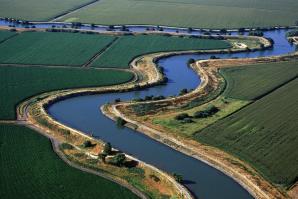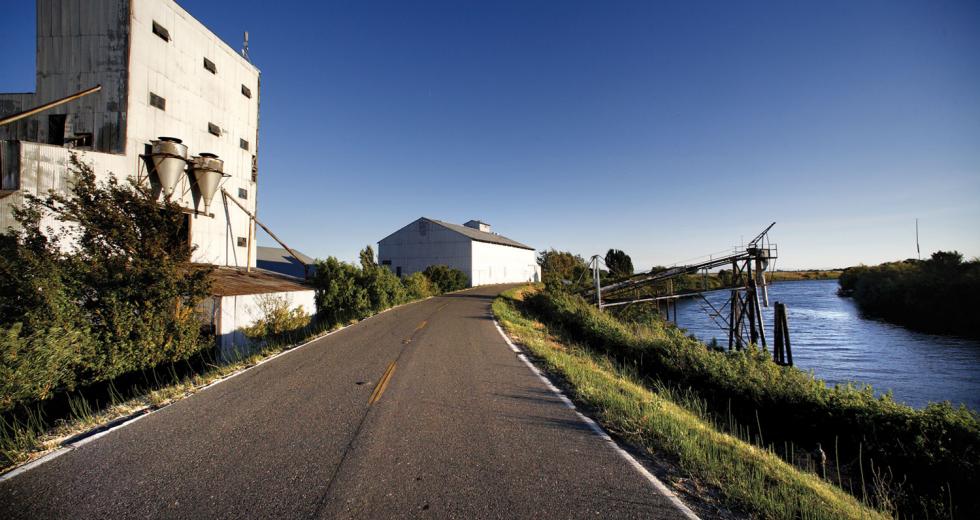It has been almost a year since California lawmakers reached an agreement on the most comprehensive overhaul of the state’s water management system in more than four decades. It was a historic agreement, so much so that Gov. Arnold Schwarzenegger essentially declared victory and claimed the state’s long-standing water wars were finally winding down. He was wrong. Ten months later, the state’s longest-running conflict is not only unresolved, the combatants have started a new fight on a familiar battlefield.
Long an advocate for Central Valley agricultural interests, Schwarzenegger had every reason to be happy with the deal he signed last November. The bill package tackled a number of topics that California’s “water buffaloes” have been after for years, including creating the Delta Stewardship Council, a new oversight agency for the Sacramento-San Joaquin Delta that theoretically could approve a new peripheral canal to transport water south. Schwarzenegger was particularly enthralled with that possibility, noting several times — much to the consternation of the package’s opponents — that it would ensure the canal would be built.
The reform package also called for greater conservation efforts statewide to support Schwarzenegger’s earlier directive for the state’s urban areas to cut water use 20 percent in 10 years. Greater effort was also promised to catch and punish people who illegally divert water from the Delta.
While reform supporters included all the usual suspects — business interests, big agriculture and huge Central Valley water agencies — the package also had buy-in from major environmental groups like Pennsylvania-based The Nature Conservancy.
As with virtually everything surrounding California water, however, the agreement also arrived with a full chorus of blood enemies singing its evils. Delta residents didn’t like that only one of the Stewardship Council’s seven members would come from the Delta region. Urban areas hated the conservation mandate, particularly since it exempted farmers, by far the state’s biggest water users. And while some hailed a provision that the state would for the first time begin collecting data on groundwater stores, environmental groups like the Sierra Club lamented that lawmakers had yielded to intense pressure from agricultural interests and declined to track how much groundwater was being taken from the aquifers and by whom. And all of them seemed ready to fight any attempt to actually build a peripheral canal.
But the greatest disdain has been aimed at the centerpiece of the entire deal, an $11.14 billion bond measure that would, in conjunction with other previously acquired bond money, fund the bulk of these efforts. From the beginning, a host of critics have railed over the bond’s enormous size, calling it a bloated payoff to coerce hesitant lawmakers by pumping billions of dollars into pet projects back in their districts. Critics also noted a provision buried deep in the details that would allow private companies to own dams built with public bond money and then sell water in those reservoirs back to the public at a profit. At least one measure has been working its way through the Assembly to remove that clause.
Of course, disagreement has been a trademark of the state’s water wars since the Spanish came to California more than 300 years ago. But this time, that argument has apparently taken hold with the one group all sides need the most: voters. Faced with polls that suggest the public was rapidly losing heart for the measure — and needing to fully invest himself into fighting another ballot measure seeking to overturn the state’s greenhouse gas emissions reduction program — Schwarzenegger asked lawmakers in late June to pull the bond measure off the November ballot in hope it will fare better in 2012.
Senate President Pro Tem Darrell Steinberg, one of the reform package’s biggest champions, quickly agreed with the governor’s proposal.
“We’ve put a lot into this,” says Steinberg, a Democrat. “It’s been 40 years of not getting anything done in this area, so we have to be sure that whenever it is on the ballot, we win.”
But putting the genie back into the bottle is never an easy task. The move required a two-thirds vote in both legislative chambers, and while Steinberg supported moving the bond to the 2012 ballot, his counterpart in the Assembly, Speaker John Perez, did not. Some of the bond’s biggest critics actually opposed taking the bond off the ballot, including certain environmental and anti-tax groups and even the California Teachers Association, which sees the bond’s annual debt service of almost a billion dollars as a threat to enhanced school funding.
Ironically, opponents argued for leaving the bond on this year’s ballot, saying voters would reject it in its current state. Such a defeat, they reasoned, would force the Legislature to scrap the whole thing and start over. There was also some question as to whether lawmakers could legally move the measure even if they agreed to do so.
In the end, however, Schwarzenegger got his wish. Lawmakers agreed in early August to push the measure to 2012 and delay starting the terms of the nine members of the California Water Commission, the entity that would be responsible for dispersing the bond monies.
But getting the bond off this year’s ballot is no guarantee it will look the same in 2012. Critics like Sen. Lois Wolk are still calling for the bond to be revised after the fall election produces a new Legislature and governor. That version would presumably ask for far less than does the current incarnation.
Steinberg, however, is not inclined to do that.
“There is a sincere danger in opening up the work product in a big way,” he says. “I’m open to anything that has consensus, but once you open something up it’s pretty hard to close it down again.”
Tim Quinn, executive director of the Association of California Water Agencies, which heavily supported the reform package, including the bond, is also opposed to bringing it back to the negotiating table. He notes that it took years of back and forth to get an agreement the first time around and disputes the perception that the bond is full of pork. “If anything, we’re asking for too little,” Quinn says.
That last point could be a hard sell to critics even in good times, much less the state’s ongoing economic downturn. It also doesn’t help the bond advocates’ cause that this spring produced rain. According to the state Department of Water Resources, California’s precipitation level through May was about 110 percent of normal with water storage at 90 percent, a big bump over previous years.
The spring rains helped prod the federal government to boost the water allocations for Central Valley agriculture, first to 40 percent in May and then to 45 percent in June. Industrial and municipal users were lifted to 75 percent of normal. Both figures are significantly higher than the original 5 percent allocation the feds offered in January. Agricultural interests got another boost in May when federal judge Oliver Wanger ruled that state and federal water officials had to consider human needs along with the well being of endangered Delta smelt when determining those allocations. Wanger also cast doubt on the science used to justify pumping limits adopted specifically for the smelt’s benefit.
Those decisions have certainly played well with downstate water users. How much they will impact what lawmakers or voters do, if at all, remains to be seen. Regardless of what eventually happens with the bond, Delta Stewardship Council chairman Phil Isenberg says his agency is moving forward with its assigned task of managing the Delta with the co-equal goals of protecting the Delta ecosystem and ensuring water reliability for the 25 million residents who depend on through-Delta water deliveries. He is also not inclined to say that this particular bond, reduced by lawmakers or rejected by voters, will have much of an impact on those efforts.
“Most of the bond funding is for long-standing regional programs,” he says. “I have absolutely no doubt California will have a long series of water bonds in the same pattern as we have had construction bonds and transportation bonds.”
What reform package advocates won’t have for much longer, however, is the towering presence of Schwarzenegger. With his term winding down, some have questioned whether he has the political muscle to keep his odd coalition of agricultural, environmental and business interests together once he has returned to private life. The oncoming gubernatorial election is also a wild card. GOP candidate Meg Whitman has stated her support for both the reform package and the bond, though she has also noted its bulk. Democratic candidate Jerry Brown, the governor during the first politically bloody peripheral canal debate 30 years ago, has kept his cards close to the vest this time out, avoiding a commitment either way.
But the water association’s Quinn dismisses that fear as well.
“We always have to deal with leadership changes,” he says. “Pat Brown wasn’t governor when the Central Valley Project made it all the way to the coast.
“This is not the path I would have chosen,” he adds. “But sometimes you just have to roll with the punches.”
Recommended For You

Water Wise Man
Engineer David Ford gives unpopular answers to flood of questions
Being the bearer of unwelcome news rarely makes you the most popular person in town, particularly when it comes to flood control. But it doesn’t worry David Ford, one of the most trusted figures on California’s sometimes-contentious flood control scene and a man with a knack for speaking what Pulitzer Prize-winning journalist Frank Hagar once called “the truth that men prefer not to hear.”

Changing Tide
Turf and money battles continue over California water reform
It’s been about 20 months since lawmakers and former Gov. Arnold Schwarzenegger breathlessly announced a historic agreement called the Sacramento-San Joaquin Delta Reform Act of 2009, an ambitious plan to overhaul the state’s antiquated water system. Much has changed since then, but much more is still on the way.



